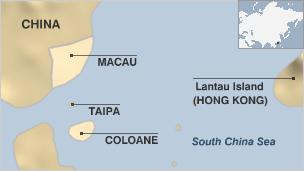Macau profile
- Published

Tiny Macau, a special administrative region of China, has seen its low-key colonial character give way to massive commercial and tourist development.
The former Portuguese colony, a near neighbour of Hong Kong, occupies a small peninsula and two islands off China's southern coast.
Its economy revolves around tourism. Macau has capitalised on its long history as a gambling centre, drawing many thousands of visitors from China and Hong Kong.
Foreign casino companies have invested heavily since Hong Kong tycoon Stanley Ho's decades-long monopoly on the gaming industry ended in 2002. New "mega-casinos", which include major hotel developments, have replaced traditional gambling dens.
In 2006 the returns from the casino boom surpassed the revenues of the US gambling mecca, Las Vegas. But analysts warn that Macau risks relying too much on the industry.
In 2014, Macau's annual revenue dipped for the first time since its casinos were liberalised 12 years earlier. The development was attributed in part to the mainland's anti-corruption drive.
Sands Casino in Macau
Chief Executive Dr Fernando Chui has since pledged to diversify the local economy in an apparent response to demands from Beijing.
The former colony reverted to Chinese sovereignty in 1999 after 400 years of Portuguese rule. Beijing promised to uphold Western-style freedoms for at least 50 years.
Although it is part of China, Macau is governed under the "one country, two systems" principle, under which it has a large degree of autonomy.
Pro-reform forces are less vocal in Macau than in Hong Kong. A new state security law came into effect in 2009 with very little opposition, whereas attempts by the Chinese government to introduce a similar law in Hong Kong in 2003 triggered mass protests.
In 2014, activists organised an unofficial poll calling for more democracy, but the vote was disrupted by the security forces and only 9,000 people took part, with 89% voting for universal suffrage by 2019.
Portuguese seafarers settled in the area in the 1500s. Initially, the colony prospered on the lucrative returns from regional trade, and European-style mansions and churches mushroomed.
Trade dwindled from the 1600s, but the introduction of licensed gambling in the mid 1800s revived Macau's fortunes.
Colonia architecture is still visible, but Portugal's stamp on Macau is fading